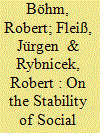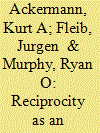| Srl | Item |
| 1 |
ID:
180227


|
|
|
|
|
| Summary/Abstract |
Despite the omnipresence of inter-group conflicts, little is known about the heterogeneity and stability of individuals’ social preferences toward in-group and out-group members. To identify the prevalence and stability of social preferences in inter-group conflict, we gather quota-representative, incentivized data from a lab-in-the-field study during the heated 2016 Austrian presidential election. We assess social preferences toward in-group and out-group members one week before, one week after, and three months after the election. We find considerable heterogeneity in individuals’ group-(in)dependent social preferences. Utilizing various econometric strategies, we find largely stable social preferences over the course of conflict. Yet, there is some indication of variation, particularly when the conflict becomes less salient. Variation is larger in social preferences toward in-group members and among specific preference types. We discuss the theoretical implications of our findings and outline potential avenues for future research.
|
|
|
|
|
|
|
|
|
|
|
|
|
|
|
|
| 2 |
ID:
143348


|
|
|
|
|
| Summary/Abstract |
There is accumulating evidence that decision makers (DMs) are sensitive to the distribution of resources among themselves and others, beyond what is expected from the predictions of narrow self-interest. These social preferences are typically conceptualized as being static and existing independently of information about the other people influenced by a DM’s allocation choices. In this article, we consider the reactivity of a DM’s social preferences in response to information about the intentions or past behavior of the person to be affected by the DM’s allocation choices (i.e., how do social preferences change in relation to the other’s type). This article offers a conceptual framework for characterizing the link between distributive preferences and reciprocity, and reports on experiments in which these two constructs are disentangled and the relation between the two is characterized.
|
|
|
|
|
|
|
|
|
|
|
|
|
|
|
|